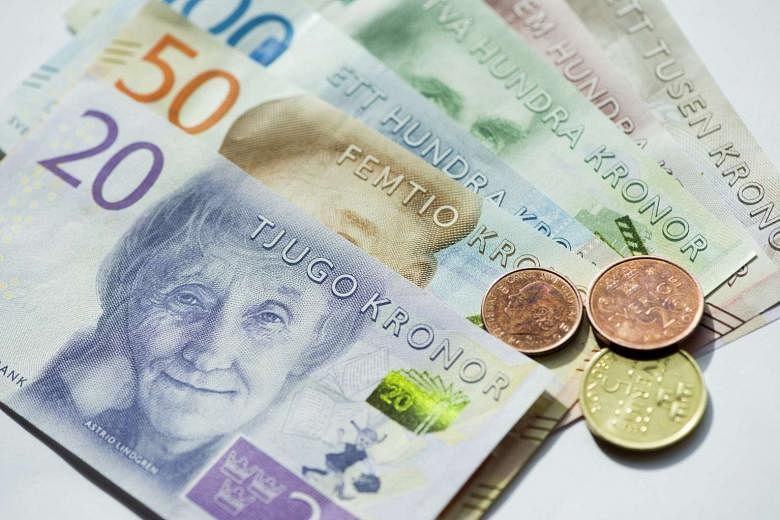STOCKHOLM (Reuters) - Wealthy Swedes face the world's highest marginal tax rates as the government begins to roll back a decade of free market reforms that made the country a favourite of investors.
Critics say the measures will make Sweden a less attractive place to do business and act as a disincentive to work.
Sweden's comprehensive but costly welfare model demands high taxes, but reforms by centre-right governments from 2006 aimed at making work pay better and trimming benefits cut the tax burden to below that in France, Finland or Belgium.
Now the pendulum has swung again. The first full budget under a year-old centre-left minority government - effective from January - will see Sweden overtake the Caribbean island of Aruba as the country with the world's highest marginal tax rate, of around 60 per cent.
It is part of an overall rise in taxes that is sparking controversy in parliament, social media and newspapers. "The government's politics are emptying people's wallets and companies' order books," said Anna Kinberg Batra, leader of the largest opposition party, the centre-right Moderates.
The National Institute of Economic Research, a government think tank, says taxes will need to rise by around 20 billion Swedish crowns (S$3.37 billion) a year to maintain the current level of public services.
It says the overall tax take could rise to 45 per cent of economic output by 2019 from 42.7 per cent last year. That compares with 48.6 per cent in neighbouring Denmark and 45 per cent in France in 2013, according to OECD figures.
Record immigration, sickness benefit costs and an ageing population could push up spending further.
"If you raise taxes again, then Sweden will be labelled again as a country where you cannot do business, it's too expensive," said Christer Wallberg, Chief Executive at software firm Tacton, 40 per cent of whose 200 staff are foreign.
Under mainly Social Democratic governments in the 20th century, Sweden became a byword for high taxes, making exiles of billionaire IKEA founder Ingvar Kamprad, who fled in the 1970s, and tennis ace Bjorn Borg. The marginal tax rate - how much of each crown a worker is taxed over a certain level - reached nearly 90 per cent for many top earners.
Growth faltered as taxes put pressure on companies ranging from national icon Volvo to corner shops.
When the centre-right won power in 2006, it ditched the philosophy epitomised by former Social Democrat leader Mona Sahlin who said it was "cool to pay taxes".
Corporate rates were cut and the overall tax burden fell around 3.5 percentage points. The country boomed. Borg and Kamprad returned home. Audi and BMW cars now compete with Volvos on the roads.
The centre-left, however, blame tax cuts for a decline in the quality of welfare and schools and a rapid rise in inequality. A few years ago, one business organised "class safaris" in Stockholm for visitors to see how the wealthy live.
- Tax and spend -
Social Democrat Prime Minister Stefan Lofven's government plans to raise 32 billion crowns by end-2016 for education, house building and job schemes.
The money will come from higher fuel duties, taxes on working pensioners and cutting support for firms giving youngsters a job. A home renovation subsidy will shrink and a tax on nuclear power will rise. A bank tax is in the works.
Top marginal tax rates will rise to 60 per cent, the highest in the world, according to consultants KPMG, from the current 57 per cent. The top tax rate applies to those earning more than 52,500 crowns (S$8,840) a month, compared with an income of 12,000 pounds (S$25,593) a month needed for Britain's 45 per cent top rate to apply.
In the 1980s, many doctors chose to work part time to bring down tax rates, straining services.
"If the incentive for working on a Sunday is only to get a few hundred crowns extra, that incentive is pretty limited,"said Johannes Arpegard, a 38-year old doctor. "It will be harder to make people take on-call or night shifts."
Even current plans for tax hikes may not be enough.
Soaring costs for sickness benefits - seen rising 60 per cent to 51 billion crowns by 2019 after the new government relaxed criteria - and mortgage tax relief could blow a hole in budgets.
Integrating 74,000 asylum seekers could meanwhile cost around 4 per cent of the budget in 2016. But asylum seeker numbers could easily be double the initial estimate.
Immigration to Sweden could bring "enormous economic strains", Home Secretary Anders Ygeman has said.
For Tacton CEO Wallberg high taxes will make it even harder to find recruits for his firm, which helps companies like Siemens, Mitsubishi and Scania match clients to products.
"A foreigner does the maths and - whoops - I only have this much left in my wallet," said Wallberg, who calls Stockholm the Silicon Valley of Europe. "The business climate has improved in the last 20 years but I am worried that step-by-step we are making it worse again."

